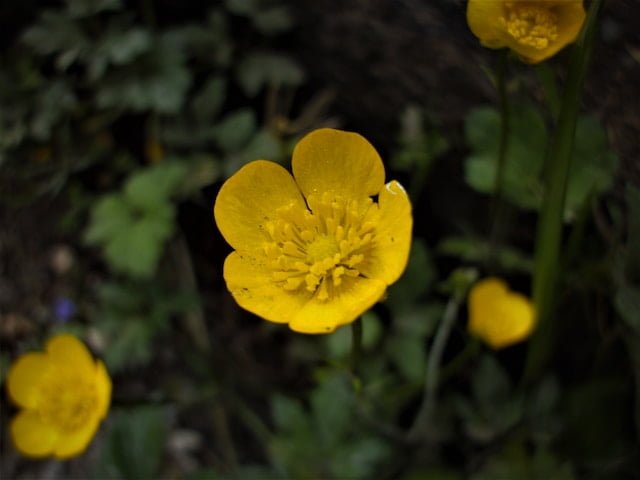Goats are known to be curious creatures that will eat almost anything. As a result, it’s important for goat owners to be aware of what foods are safe for their animals to consume. One plant that has been the subject of much debate in the goat community is the buttercup. So, can goats eat buttercup?
The answer is not a straightforward yes or no. Buttercups contain a substance called protoanemonin, which can be toxic to animals in large quantities. However, the concentration of protoanemonin varies depending on the species of buttercup and the stage of growth. Some types of buttercup, such as the creeping buttercup, are more toxic than others. In small amounts, buttercup is not likely to cause harm to goats, but it’s important to monitor their intake and avoid feeding them large amounts.

What Are Buttercups
Buttercups are a type of flowering plant that belongs to the Ranunculaceae family. They are known for their bright yellow flowers and are commonly found in meadows, pastures, and fields. Buttercups are also known by their scientific name, Ranunculus.
Buttercups are often considered weeds because they can be invasive and toxic to livestock. They contain a toxic substance called protoanemonin, which can cause severe irritation and blistering of the skin and mucous membranes.
Buttercup Varieties
There are several different varieties of buttercups, including:
- Meadow Buttercup (Ranunculus acris): This is the most common variety of buttercup and is found throughout Europe and Asia. It has bright yellow flowers and can grow up to three feet tall.
- Creeping Buttercup (Ranunculus repens): This variety of buttercup spreads quickly and can be invasive. It has small yellow flowers and can grow up to one foot tall.
- Bulbous Buttercup (Ranunculus bulbosus): This variety of buttercup has bright yellow flowers and can be found in meadows and pastures. It grows up to one foot tall.
- Lesser Celandine (Ranunculus ficaria): This variety of buttercup has bright yellow flowers and can be found in woodlands and along streams. It grows up to six inches tall.
It is important to note that all varieties of buttercups contain protoanemonin and should not be consumed by humans or livestock.
Goats and Their Diet
Goats are known for their versatile diet, as they can eat a variety of plants and vegetation. However, not all plants are safe for goats to consume, and some can even be toxic to them. As a goat owner, it is important to understand what foods are safe and healthy for your goats to eat.
When it comes to a goat’s diet, it is essential to provide them with a balanced and nutritious diet. This includes hay, grass, and other vegetation. Goats also require minerals and vitamins, which can be provided through supplements or mineral blocks.
It is important to note that goats have a sensitive digestive system, and sudden changes in their diet can cause digestive issues. Therefore, it is recommended to introduce new foods gradually and in small amounts.
Some plants that are safe for goats to eat include:
- Alfalfa
- Clover
- Timothy
- Bermuda grass
- Rye grass
- Orchard grass
On the other hand, some plants that are toxic to goats include:
- Rhododendron
- Azalea
- Oleander
- Foxglove
- Buttercup
In conclusion, understanding a goat’s diet is crucial for their health and well-being. Providing them with a balanced and nutritious diet, along with safe and appropriate vegetation, can help ensure they live a happy and healthy life.
The Effects of Buttercup on Goats
Short Term Effects
When goats consume buttercup in small amounts, it usually does not cause any immediate harm. However, when consumed in large quantities, buttercup can cause some short term effects on goats. Some of these effects are:
- Diarrhea
- Vomiting
- Abdominal discomfort
- Loss of appetite
These symptoms usually last for a few hours and may go away on their own. However, if the goat continues to consume buttercup, these symptoms may become more severe and can lead to long term effects.
Long Term Effects
When goats consume buttercup over a long period of time, it can have some serious long term effects on their health. Some of these effects are:
- Liver damage
- Photosensitization
- Weight loss
- Anemia
Buttercup contains a toxin called protoanemonin which can cause liver damage in goats. This can lead to photosensitization which is a condition where the skin becomes sensitive to sunlight and can result in skin damage. Goats that consume a large amount of buttercup over a long period of time may also experience weight loss and anemia.
It is important to note that not all goats are affected by buttercup in the same way. Some goats may be more sensitive to the toxin than others. Additionally, the amount of buttercup consumed and the duration of consumption can also affect the severity of the symptoms.
In conclusion, while goats can eat buttercup in small amounts without any immediate harm, it is best to avoid it altogether to prevent any potential long term effects on their health.

Preventing Buttercup Consumption
When it comes to feeding goats, it’s important to be aware of what they eat. Buttercup is a common plant that grows in many pastures and fields, but it’s not safe for goats to eat. Buttercup contains a toxin called ranunculin, which can cause a variety of health problems for goats.
To prevent buttercup consumption, we recommend the following measures:
- Regular pasture maintenance: Keep pastures mowed and free of weeds. This will help prevent buttercup from growing in the first place.
- Provide alternative forage: If your goats don’t have access to good pasture, consider providing them with hay or other forage. This will help ensure that they’re getting the nutrients they need without the risk of buttercup poisoning.
- Fence off buttercup patches: If you have buttercup growing in your pasture, consider fencing it off to prevent your goats from accessing it. This can be especially important during times when other forage is scarce.
- Monitor your goats: Keep an eye on your goats and watch for signs of buttercup poisoning, such as diarrhea, vomiting, and loss of appetite. If you suspect your goats have eaten buttercup, contact your veterinarian immediately.
By taking these steps, you can help prevent buttercup consumption and keep your goats healthy and happy.
Alternatives to Buttercup in Goat Diet
When it comes to feeding goats, it’s important to provide them with a balanced diet that meets their nutritional needs. While buttercup may be a common plant found in pastures, it can be toxic to goats if consumed in large quantities. Fortunately, there are several alternative plants that can be included in a goat’s diet to provide similar nutritional benefits without the risk of toxicity.
One alternative to buttercup is clover. Clover is a legume that is high in protein and fiber, making it a great addition to a goat’s diet. It is also rich in vitamins and minerals, including calcium, phosphorus, and magnesium. Clover can be fed fresh or dried, and can be found in many pastures and hay fields.
Another alternative to buttercup is alfalfa. Alfalfa is a legume that is high in protein, calcium, and other essential nutrients. It can be fed fresh or dried, and is often used as a supplement in a goat’s diet. However, it should be fed in moderation, as too much alfalfa can lead to urinary calculi in male goats.
In addition to clover and alfalfa, other plants that can be included in a goat’s diet include:
- Timothy hay: a grass hay that is high in fiber and low in protein
- Orchard grass: a grass hay that is high in fiber and moderate in protein
- Bermuda grass: a warm-season grass that is high in protein and low in fiber
- Fescue: a cool-season grass that is high in fiber and moderate in protein
It’s important to note that while these plants are safe for goats to consume, they should still be fed in moderation as part of a balanced diet. It’s also important to ensure that any hay or pasture plants are free from mold or other contaminants that could be harmful to goats. By providing a variety of safe and nutritious plants, we can ensure that our goats stay healthy and happy.
Conclusion
Based on our research, we can conclude that goats should not eat buttercup. Although buttercup is not toxic to goats, it contains a high concentration of protoanemonin, which can cause irritation and inflammation in the digestive system.
Goats that eat buttercup may experience symptoms such as diarrhea, vomiting, and abdominal pain. In severe cases, the inflammation can lead to dehydration, weight loss, and even death.
Therefore, it is important for goat owners to prevent their animals from grazing on areas where buttercup is present. This can be achieved by removing buttercup plants from the pasture or by fencing off areas where the plant grows.
In addition, goat owners should provide their animals with a balanced diet that meets their nutritional needs. This can help prevent them from grazing on toxic plants and ensure that they remain healthy and productive.
Overall, while goats are known for their ability to eat a wide variety of plants, it is important for owners to be aware of the risks associated with certain types of vegetation. By taking the necessary precautions and providing their animals with proper care, goat owners can help ensure the health and well-being of their herds.

Frequently Asked Questions
Are buttercups poisonous to goats?
Yes, buttercups are poisonous to goats. They contain a toxin called protoanemonin, which can cause severe irritation and inflammation in the mouth, stomach, and intestines of goats. Ingesting large quantities of buttercups can also lead to diarrhea, dehydration, and even death.
What plants are toxic to goats?
There are many plants that are toxic to goats, including rhododendron, azalea, yew, hemlock, nightshade, and oleander. It’s important to keep your goats away from these plants to prevent them from getting sick or dying.
Can goats eat dandelions?
Yes, goats can eat dandelions. In fact, dandelions are a good source of vitamins and minerals for goats. However, you should make sure that the dandelions haven’t been sprayed with herbicides or pesticides, as these can be harmful to goats.
What animals eat buttercups?
Buttercups are generally avoided by most animals, as they are known to be toxic. However, some insects, such as caterpillars and beetles, are able to feed on buttercups without being harmed.
Are buttercups poisonous to farm animals?
Yes, buttercups are poisonous to many farm animals, including cows, horses, and sheep. They can cause similar symptoms in these animals as they do in goats, such as mouth and stomach irritation, diarrhea, and dehydration.
What plants are highly toxic to goats?
Some plants that are highly toxic to goats include poison ivy, poison oak, and poison sumac. These plants can cause severe skin irritation and allergic reactions in goats, and can even be fatal if ingested in large quantities. It’s important to keep your goats away from these plants at all times.





